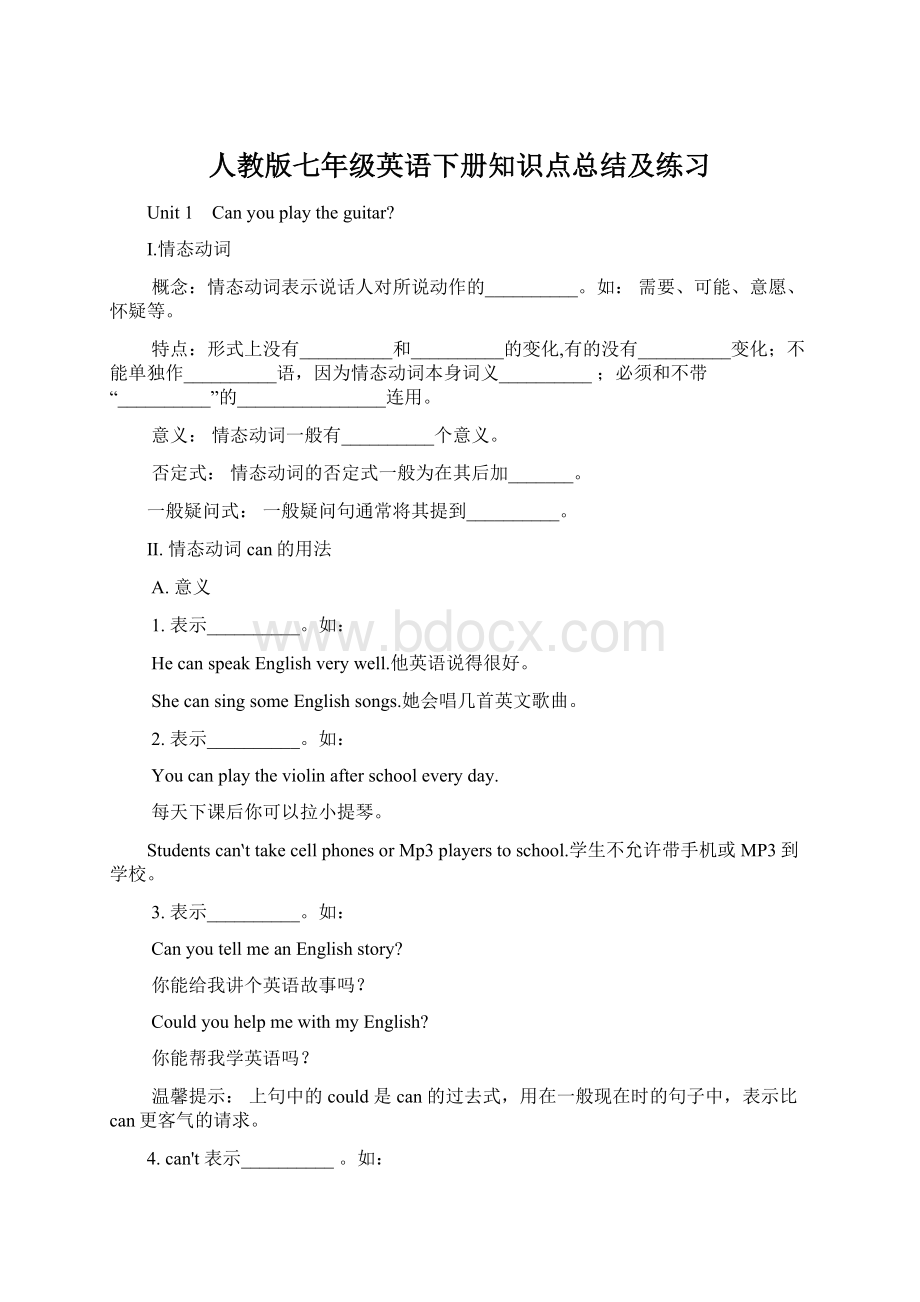 人教版七年级英语下册知识点总结及练习Word格式.docx
人教版七年级英语下册知识点总结及练习Word格式.docx
- 文档编号:21714108
- 上传时间:2023-01-31
- 格式:DOCX
- 页数:46
- 大小:46.04KB
人教版七年级英语下册知识点总结及练习Word格式.docx
《人教版七年级英语下册知识点总结及练习Word格式.docx》由会员分享,可在线阅读,更多相关《人教版七年级英语下册知识点总结及练习Word格式.docx(46页珍藏版)》请在冰豆网上搜索。

CouldyouhelpmewithmyEnglish?
你能帮我学英语吗?
温馨提示:
上句中的could是can的过去式,用在一般现在时的句子中,表示比can更客气的请求。
4.can'
t表示__________。
—IsthatMr.Smith?
那是史密斯先生吗?
—Thatcan'
tbehim.HeisinNewYorknow.
那不可能是他。
他现在在纽约呢。
B.句型变化
肯定句:
Hecanplaythe_drums.
否定句:
He_________playthedrums.
一般疑问句:
_________he_________thedrums?
两种回答:
Yes,he_________./No,he_________.
对画线部分提问:
________________heplay?
┃能力提升训练┃
Ⅰ.完形填空
Jackismyuncle.Heis__1__theschoolmusicclub.Helikesmusicverymuchandheisagreat__2__.Hecanplay__3__drumsverywell.Hehasadaughter.Sheismy__4__.__5__nameisJune.Sheisonlyfouryearsold,__6__shecanplaytheguitarverywell.Sheoftengoestothemusicclub__7__herfatheronweekends.
Doyou__8__jointheschoolmusicclub?
Please__9__Jack.His__10__is3455678.
()1.A.on B.in C.of D.to
()2.A.runnerB.Musician
C.moviestarD.actor
()3.A.aB.anC.theD./
()4.A.cousinB.Aunt
C.grandmotherD.mother
()5.A.SheB.HeC.HisD.Her
()6.A.andB.toC.butD.for
()7.A.withB.andC.ofD./
()8.A.wantB.wanttoC.likeD.go
()9.A.needB.CallC.showD.meet
()10.A.IDcardnumberB.roomnumber
C.phonenumberD.telephone
Ⅱ.阅读理解
Mr.andMrs.BrowncomefromSydney.TheyteachEnglishinamiddleschool.Theylovetheirwork.Theyhavetwochildren—JimandSue.TheyareallinHefeinow.Mr.BrowncanspeakChinese.HecandoChinesekungfu.
Mr.Brownlikesswimmingandreading.ButMrs.BrownlikespaintingandplayingChinesechess.Theyoftengoswimmingintheafternoonandplaychessintheevening.OnSundaymorningMr.BrowndoChinesekungfu.JimandSuelikeplayinggames.TheyoftenplaygameswithChineseboysandgirls.
Jim'
suncle,GreenworksonafarmnearSydney.Helikesswimming,too.HealsowantstoworkinHefei.Buthecan'
tspeakChinese.SoheisstillinAustraliaandgoestoChineseclasseseveryweek.
()1.WhereareJimandSuefrom?
A.They'
refromAmerica.
B.They'
refromCanada.
C.They'
refromAustralia.
D.They'
refromEngland.
()2.WhatdoesMrs.Brownlike?
A.Shelikesreadingandswimming.
B.Shelikesteachingandplayinggames.
C.ShelikespaintingandplayingChinesechess.
D.ShelikesplayingchessanddoChinesekungfu.
()3.WhatdoesSue'
suncledo?
A.He'
saworker.B.He'
sadriver.
C.He'
safarmer.D.He'
sateacher.
()4.WhatdoesSue'
sunclelike?
A.Helikesreading.
B.Helikesplayingchess.
C.Helikeshiswork.
D.Helikesswimming
()5.Whoworkindifferentcountriesnow?
A.Mr.andMrs.Brown.
B.Mr.Brownandhisuncle.
C.Mrs.Brownandheruncle.
D.Mr.Brownandhisbrother
Ⅰ.单项选择
()1.—Canyou________himtostopsmoking?
—Sure.
A.tell B.say C.talk D.speak
()2.Thelittleboy________Englishvery________.
A.speaks;
good B.speaks;
well
C.says;
wellD.tells;
Ⅱ.用good或well填空
1.Heisa________student;
heis________and
studies________.
2.Thefoodsmells________anditsells________.
Ⅲ.使用适当的介词填空
1.Runningisgood________aman'
shealth.
2.Parentsaren'
talwaysgood________theirchildren
3.Theladyisverygood________hercat.
4.Ifyouarenotgood_________driving,you'
d
betterkeepthecaraway.
Ⅳ.使用所给词的适当形式填空
1.Thebookisvery____________(interest).
2.Ineeda__________(relax)holiday.
3.Areyou__________(interest)inmusic?
4.Hedoesn'
tfeel__________(relax)whenheisat
work.
Unit2 Whattimedoyougotoschool?
.
Ⅰ.一般现在时态特殊疑问句的结构
1.结构:
特殊疑问词+be+主语?
特殊疑问词+助动词do/does+主语+实义动词?
When/Whattimeistheparty?
Whendoyougotoschool?
Whattimedoeshegotowork?
常用的特殊疑问词:
________/________________(什么时候),________(什么地方),________(谁),________(谁的),________(如何)。
2.对画线部分提问:
(1)Theygetdressedat_six.
→________________________theygetdressed?
(2)Shetakesawalkat_nine.
→________________she_______awalk?
(3)Heusuallyswimsin_the_lake.
→________________he________?
(4)Jackgoestoschoolon_foot.
→________________Jack________toschool?
温馨提示:
whattime对具体某一时刻进行提问;
when对笼统时间进行提问。
Ⅱ.英语时间表示法
1.使用数字( ________ 数+________数)。
7:
20 seventwenty;
8:
55 eightfiftyfive。
2.使用介词(past或to)。
当分钟数≤30分钟时,使用介词________,“分钟数+past+小时数”。
9:
10 tenminutespastnine;
10:
30 halfpastten;
当分钟数>30分钟时,使用介词________,“(60-分钟数)+to+(小时数+1)”。
如:
11:
40 twentyminutestotwelve.
(1)特殊时间段的表示法:
30分钟可以使用________代替;
15
分钟可以使用________代替。
5:
30halfpastfive;
9:
45 aquartertoten。
(2)在某一时刻使用介词________。
(3)提问时间使用:
“Whattimeisit?
”或“What'
sthe
time?
”
Ⅲ.英语中的频度副词的用法
英语中常用的频度副词及含义:
________(总是;
一直),________(通常),________(从来没有),___________(有时
候)等,常用在行为动词前。
Iusuallytakeawalkafterdinner.
晚饭后我经常散步。
Henevergoestoschoollate.
他上学从不迟到。
Theysometimeseatlunchatschool.
他们有时候在学校吃午饭。
┃能力提升训练┃
I__1__aschoolgirl.Myschoolisfar__2__myhome.Imust__3__upveryearlyeverymorning.Iusuallygotoschoolby__4__.Everydayit__5__meabouthalfanhourtogetthere.Ihavenotime__6__breakfastathome.Ioftenhavesomebread__7__breakfastonmybike.Idon'
twantto__8__lateforthemorningexercises.Ihave__9__atschool.SometimesIplaybasketballwithmyclassmatesafterschool.Ioftenget__10__atabout6:
00.
()1.A.be B.am C.is D.are
()2.A.atB.toC.inD.from
()3.A.getB.getting
C.getsD.toget
()4.A.abikeB.thebike
C.bikeD.bikes
()5.A.getsB.brings
C.usesD.takes
()6.A.hasB.have
C.havingD.tohave
()7.A.toB.forC.likeD.with
()8.A.beB./C.goD.come
()9.A.supperB.thesupper
C.breakfastD.lunch
()10.A.toschoolB.school
C.tohomeD.home
HanssaystohisfriendKurt,“I'
mgoingtodrivetoLondon.”
Kurtsays,“DrivingtoLondonisveryhard.Youaren'
tgoingtofindyourhotel.”ButHansisnotafraid.HedrivestoCalais,putshiscarontheship,takesitoffatDover,anddrivestoLondon.
Hestopsnearthecityandlooksathismap.ThenhedrivesintoLondon,buthecan'
tfindhishotel.He
drivesroundandroundforanhour,andthenhestopsandgetsoutofhiscar.Ataxicomes,andHansstopsit.“TakemetotheBrusselsHotel,”hesays.Buthecan'
tgetintothetaxi:
hegetsbackintohiscar.Thetaximanlaughs,butthenhedrivestotheBrusselsHotel,andHansfollowshiminhiscar.Theyreachthehotelintwominutes.
()1.HansgoestoLondonby________.
A.CarB.sea
C.AirD.bothseaandland
()2.Hansloseshiswayin________.
A.CalaisB.LondonC.DoverD.Brussels
()3.Hanscannotfindhishotelbecause________.
A.hehasamap
B.hehasnomap
C.itisnoteasytofindtheway
D.heisnotgoodatdriving
┃易错点针对训练┃
Ⅰ.单项选择
()1.—Eitheryouorshe________ondutytoday,
don'
tforgetit.
—OK,Iwon'
t.
A.is B.am C.are D.be
()2.—Myparentsaskmetofinishmyhomework
________afterschool.
—It'
sagoodhabit.
A.one B.first C.onesD.once
Ⅱ.用first,one,ones或once填空
1.Heisthe________intheEnglishtest.
2.—Pleasehaveanapple.
—Thanks,Ihave________.
3.Theseapplesaregreen,andthered________are
inthebasket.
4.Hecleanshiscar________aweek.
Ⅲ.用所给词的适当形式填空
1.EithersheorI________(be)busythisweek.
2.Neitheryounorhe________(be)atworknow.
3.There________(be)twobooksandapenonthedesk.
4.________(arrive)atschoolontime,hegetsupveryearly.
Ⅳ.同义句转换
Hehasajobintown.
Hehas________________________________intown.
Unit3 Howdoyougettoschool?
Ⅰ.how引导的一般现在时态的特殊疑问句
1.特殊疑问词how提问动作的________。
—Howdoyougotoschool?
“你如何上学呢?
—Iridemybiketoschool.“我骑自行车去上学。
”
2.表达动作行为的方式,使用动词take(乘坐)、ride(乘车)、walk(步行)、fly(乘飞机)等;
使用介词by等。
主语+take/ride/walk/fly+to+地点=主语+goto+地点+by+交通工具。
(1)HetakestheplanetoBeijing.
=He___________________Beijing.
=HegoestoBeijingby_____________.
(2)Shewalkstoschool.
=Shegoestoschool__________________.
Ⅱ.howfar与howlong的区别
howfar是提问两地之间的_________,howlong用来提问 _______________或某个事物的_________。
Itisfivekilometersfrommyhometomyschool.(距离)
→______________isitfromyourhometoyourschool?
Theriveris1,000kilometerslong.(距离)
→______________istheriver?
Themeetingis2hours.(时间段)
→______________isthemeeting?
Ⅲ.hundred的两种用法
1.hundredsof+名词复数,“数以百记的,成百上千的,”表示一种“___________”;
2.数字+hundred+名词复数,“……百”,表示“___________”。
Therearehundredsofpeopleontheisland.
岛屿上有成百上千的人。
Hehasfivehundredinterestingbooks.
他有五百本有趣的书籍。
Somedaylittlecarsmaytaketheplaceoftoday'
scars.Ifeveryone__1__suchalittlecarinthefuture,therewillbelesspollutionintheairandtherewillbemoreparkingspaceincities,andthestreetswillbe__2__crowded.Thespacenowforonecaroftheusualsizecanhold__3__onesuchlittlecar.
Thelittlecarswill__4__muchlesstoownandtodrive.Drivingwillbe__5__,too,becausetheselittlecarscangoonly50kilometersanhour.
Thecarsofthefuturewillbefineforgoing__6__thecity,buttheywillnotbeusefulforgoingfaraway
- 配套讲稿:
如PPT文件的首页显示word图标,表示该PPT已包含配套word讲稿。双击word图标可打开word文档。
- 特殊限制:
部分文档作品中含有的国旗、国徽等图片,仅作为作品整体效果示例展示,禁止商用。设计者仅对作品中独创性部分享有著作权。
- 关 键 词:
- 人教版七 年级 英语 下册 知识点 总结 练习
 冰豆网所有资源均是用户自行上传分享,仅供网友学习交流,未经上传用户书面授权,请勿作他用。
冰豆网所有资源均是用户自行上传分享,仅供网友学习交流,未经上传用户书面授权,请勿作他用。


 铝散热器项目年度预算报告.docx
铝散热器项目年度预算报告.docx
